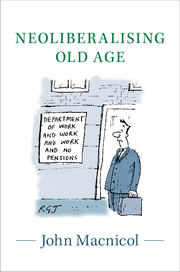6 - Intergenerational equity
Published online by Cambridge University Press: 05 November 2015
Summary
What obligations do different generations have towards each other? Should there be consistent treatment across generations? How should public expenditure be allocated between generations? These and other related questions have always been central to the study of ageing and old age, but they have assumed renewed importance of late with the re-emergence of a debate on intergenerational equity – put simply, the question of whether each generation should receive a fair allocation of resources, compared with those generations that have gone before and will follow. Immediately, of course, problems arise – most notably, how one might define a generation, what constitutes ‘fairness’ or exactly how any reallocation would take place. These and other issues will be discussed in the pages that follow. It will be argued that, although generational analysis is important, the revival of intergenerational equity concerns is a symptom of the neoliberalisation of old age that is the central theme of this book. It has made up one of the justifications for cutting back welfare support to retired people and forcing them to work later in life.
The recent debate
It has taken an economic recession, massive cuts in public expenditure and a notional change in the political culture to breathe new life into a debate that appeared some thirty years ago in the USA during the neoconservative hegemony. Social policy in the UK has recently appeared to favour older people over younger, and questions have been asked about the fairness of this. Intergenerational equity has been much discussed in the UK media, with nearly every announcement of public expenditure cuts being accompanied by a crude generational impact statement. Concerns that today's children may end up worse off than their parents are emblematic of wider twenty-first-century fears that, for western societies, economic growth may have stalled and post-Enlightenment narratives of progress may no longer apply in an increasingly dystopian future. Intergenerational equity has been explored in several populist books, more seriously by research funding bodies like the Equality and Human Rights Commission and the Leverhulme Trust, and by new pressure groups: in the UK, the Intergenerational Foundation; in the USA, Americans for Generational Equity; in Germany, the Foundation for the Rights of Future Generations.
- Type
- Chapter
- Information
- Neoliberalising Old Age , pp. 136 - 170Publisher: Cambridge University PressPrint publication year: 2015



